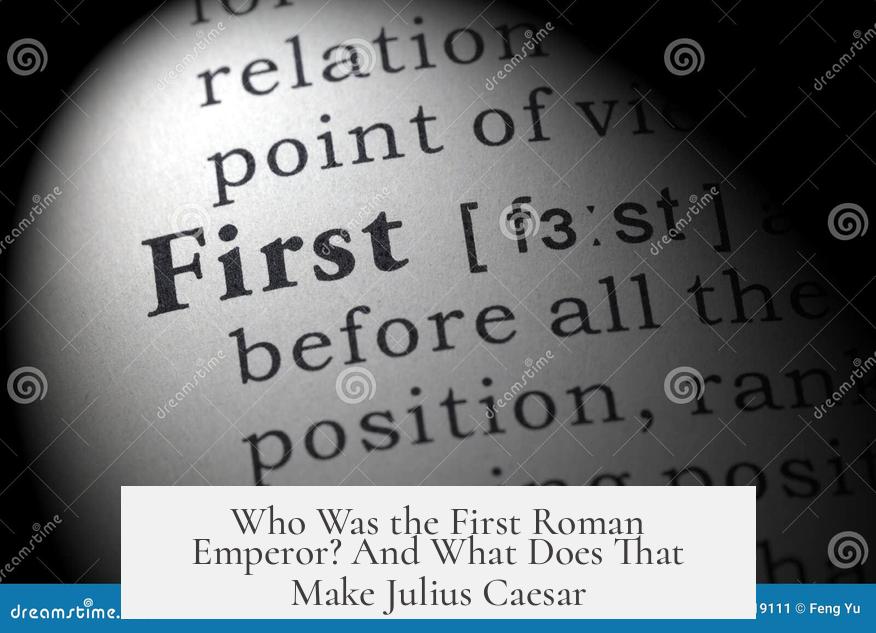Augustus is considered the first Roman Emperor, while Julius Caesar was a dictator whose actions paved the way for the imperial system. Augustus did not style himself as an emperor in the modern sense but held consolidated powers agreed upon by the Senate in 27 BCE. Julius Caesar, on the other hand, was a leading figure of the late Roman Republic who accumulated extraordinary authority but remained a republican official legally holding the title of Dictator.
The title “emperor” (from Latin imperator) evolved later, with Augustus seen retrospectively as the first emperor. Augustus referred to himself as Princeps, meaning “first among equals,” steering clear of monarchical titles. His authority merged several republican offices and imperium (military command), creating a new political system called the Principate. After Augustus established this structure, it became accepted that supreme power resided in one individual, marking a transition from Republic to Empire.
Julius Caesar’s position was different but crucial. He was appointed Dictator, a temporary role granted by the Senate during emergencies. Unlike later emperors, his power was legally based within the Republic’s framework. Along with this, he held titles such as High Priest of Rome and Tribune of the People, giving him significant religious, political, and military authority. Caesar’s power came from personal charisma and military success rather than hereditary or institutionalized imperial rule.
The key difference is that Caesar’s role was exceptional but limited by Republican precedents. He controversially named himself dictator for life, which alarmed many senators who feared the end of the Republic and a return to monarchy. This led to his assassination in 44 BCE. His death sparked civil wars that ultimately enabled his adoptive heir Octavian (later Augustus) to consolidate power permanently.
The transformation into empire happened after Augustus’ victory and the Senate’s recognition of his personal authority. Augustus combined the powers of Tribune and Censor without formally holding the titles and had imperium surpassing other magistrates. This legal framework centralized power effectively in one ruler. Thus, Augustus is considered the first Roman emperor because he institutionalized the system of one-man rule that lasted centuries.
In contrast, Julius Caesar remains a Republican dictator who set the stage but never established a lasting monarchical system. His title was temporary and non-hereditary, while Augustus initiated a hereditary succession through the Principate. The emperorship later became closely tied to the name Caesar, which evolved into a title for rulers (such as Kaiser and Czar).
| Aspect | Julius Caesar | Augustus |
|---|---|---|
| Title | Dictator (for life), Imperator | Princeps, with powers of Tribune, Censor, and Imperium |
| Legal Basis | Republican offices, temporary emergency powers | Senate agreement creating Principate system |
| Nature of Power | Personal charisma, military command, non-hereditary | Institutionalized one-man rule, hereditary succession |
| Relation to Empire | Precursor to imperial rule | First de facto emperor, founder of Roman Empire |
To summarize key points:
- Augustus is the first Roman Emperor due to the consolidation of power under the Principate from 27 BCE onward.
- Julius Caesar was a dictator whose extraordinary powers acted within the Republic’s structure but were not imperial.
- Augustus institutionalized a system where supreme power was hereditary and centralized in a single ruler.
- Julius Caesar’s accumulation of titles and lifetime dictatorship threatened Republican traditions, leading to his assassination.
- The term “emperor” and imperial rule were retrospective labels applied to Augustus and his successors.
- The name Caesar evolved into a title for later emperors, cementing the legacy of both figures in Roman history.
Who Was the First Roman Emperor? And What Does That Make Julius Caesar?

Short answer: Augustus is considered the first Roman Emperor, but Julius Caesar was not an emperor. Caesar was a dictator operating within the Republic’s rules, while Augustus, his heir, created a new system that evolved into the Roman Empire.
Sounds simple, right? But the story beneath is a bit more tangled and intriguing. Let’s unpack it.
Why Augustus, Not Julius Caesar, is Called the First Emperor
At first glance, this might feel like splitting hairs. Julius Caesar had power, armies, titles—the guy practically ran Rome. So why don’t historians call him the first emperor?
The title “emperor” itself is a tricky one. Augustus never called himself emperor; in fact, he styled himself Princeps, or “first among equals.” The term “emperor” is something people slapped on him after his reign, based on how his power shaped Rome’s future.
In 27 BCE, Augustus reached an agreement with the Senate that officially bundled enormous powers—military, religious, political—into him as a single ruler. That moment marks the traditional start of the Roman Empire. Before that, Rome was a Republic with elected officials, even if things were getting messy.
What Was Julius Caesar Then?
Julius Caesar operated under the Republic’s laws. He took the title Dictator, which was meant as a temporary emergency role. His job? Fix Rome’s problems, lead the military, and keep order.
But Caesar didn’t just stop at a quick fix. He stacked his titles: High Priest of Rome, Tribune of the People (think early veto power), and Imperator (army commander). More than that, he made himself Dictator for Life. This made many in the Senate nervous. They thought Caesar aimed to end the Republic and crown himself king.
So, while Julius Caesar had a ton of power, he worked within the Republic’s framework — although pushing its limits and alarming its defenders.
Augustus’ Game-Changing Power Package
Augustus, birth name Octavian, inherited Caesar’s legacy during Rome’s civil wars. His moment came after defeating Antony and Cleopatra. The Senate granted him a clever combo of powers:
- Tribune-like powers giving veto authority
- Imperium power exceeding all other magistrates
- Religious authority previously spread among different offices
None of these were “emperor” officially. Yet, combined, they created a new system called the Principate, which centralized power in Augustus’ hands without shaking the Republic’s appearance.
Emperor: A Retrospective Title with Lasting Impact
The key difference? Augustus’ power was hereditary. The Emperor’s authority passed down successors, eventually becoming unchallengeable. This endurance is why historians call Augustus Rome’s first emperor. The system he installed survived long after his death, unlike Caesar’s temporary dictatorship.
Interestingly, the title “Caesar” itself became synonymous with imperial power, morphing into words like Kaiser in Germany and Czar in Russia. Not a bad legacy for Julius!
But What Does This Mean for Julius Caesar’s Legacy?
Julius Caesar was the spark. He disrupted centuries of Republican stability and set the stage for Rome’s transformation. He showed what one man could do with military skill, political savvy, and bold ambition.
However, Caesar was still a politician with a legal mandate—albeit an unprecedented one. Augustus was a ruler who redefined leadership by building a new political order. Imagine Julius as a revolutionary leader creating waves and Augustus as the architect building the empire out of those waves.
Practical Takeaway: Why Care?
This distinction matters in history and today when we talk about leadership and power. Are you a trailblazer shaking the system or the organizer cementing new rules? It’s a dance between charisma and structure, both vital but different.
Understanding Augustus and Caesar helps us grasp how empires form—not overnight, but through layers of law, power, and political negotiation.
In Summary
- Julius Caesar: Dictator for Life, powerful leader within the Republic, but not emperor.
- Augustus: First true Roman Emperor in a practical sense, crafting the Principate, combining powers, and securing hereditary succession.
- Emperor was not a title Augustus claimed but a role history credits him with because his system endured.
- Caesar as a title became synonymous with supreme power and monarchy, thanks to this profound political shift.
So, when you hear “Who was the first Roman Emperor?” remember: Augustus. And Julius Caesar? He was the kingmaker, the game-changer, the legend paving the royal road. Without him, Rome’s empire might never have risen.
What would Rome be without either? That’s a question historians love to debate—because the clash between Republic and Empire shapes much of Western world history.
Are you more a Julius or an Augustus type in your own life? The bold disruptor or the steady builder? Let’s contemplate that while picturing the grandeur—and intrigue—of ancient Rome.
Who was the first Roman Emperor?
Augustus is considered the first Roman emperor. Though never officially declared emperor, he held consolidated power under the title Princeps starting in 27 BCE. His rule marked the beginning of imperial Rome.
If Augustus was the first emperor, what was Julius Caesar’s role?
Julius Caesar was a dictator, a legal office during emergencies within the Republic. He took absolute power but never held the title or role that defined imperial rule. Augustus inherited and formalized that authority.
Why is Julius Caesar not called the first emperor?
Caesar ruled through emergency powers and personal influence, not through a settled system. Augustus created a lasting, hereditary system of power accepted by the Senate, making him the first emperor in practice.
How did the title “emperor” originate from Julius Caesar’s time?
‘Emperor’ comes from the military title Imperator, used by Caesar as a commander. Over time, ‘Caesar’ evolved into a title signifying imperial power, influencing later titles like Kaiser and Tsar.
What is the difference between a dictator and an emperor in Roman terms?
A dictator was a temporary leader chosen in crisis, while an emperor held continuous, hereditary power. Caesar named himself dictator for life, which alarmed the Senate and contributed to the Republic’s fall.
How did Augustus establish his power compared to Julius Caesar?
Augustus used legal settlements with the Senate to combine multiple powers under one office. He ruled as Princeps with accepted authority, while Caesar ruled more by force and personal dominance.


